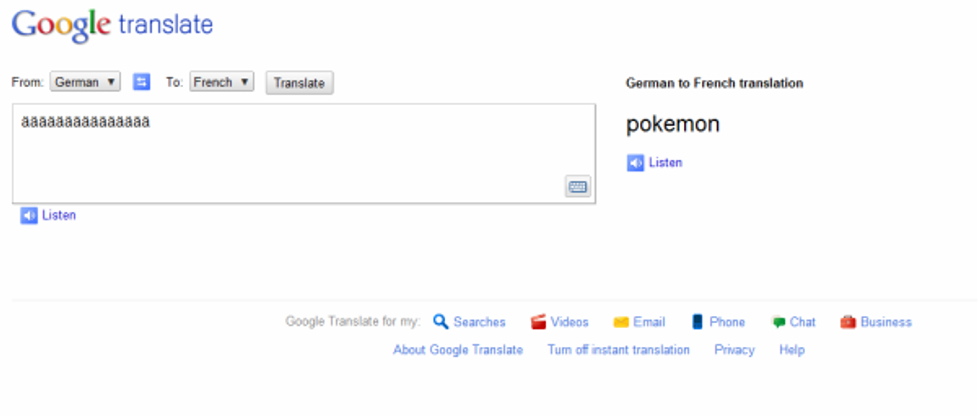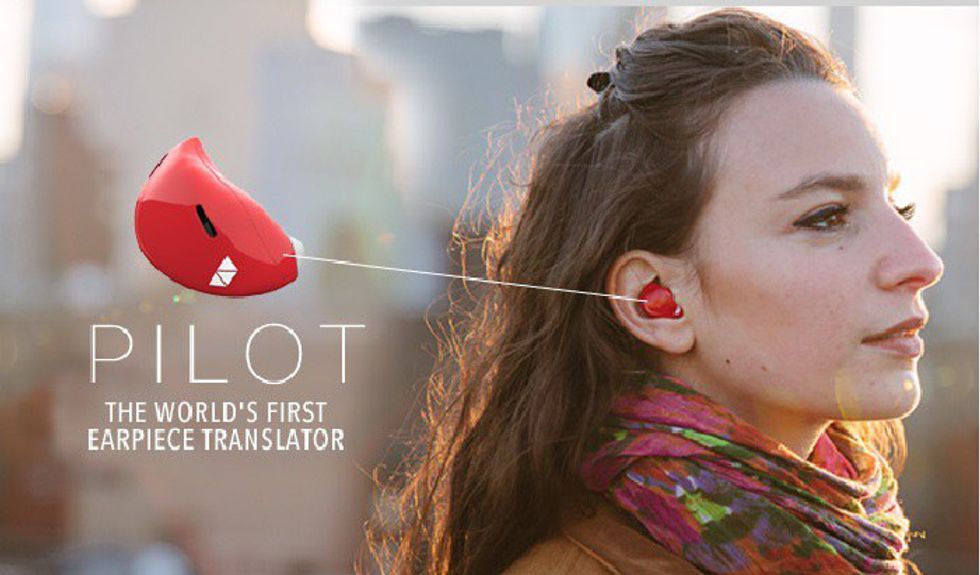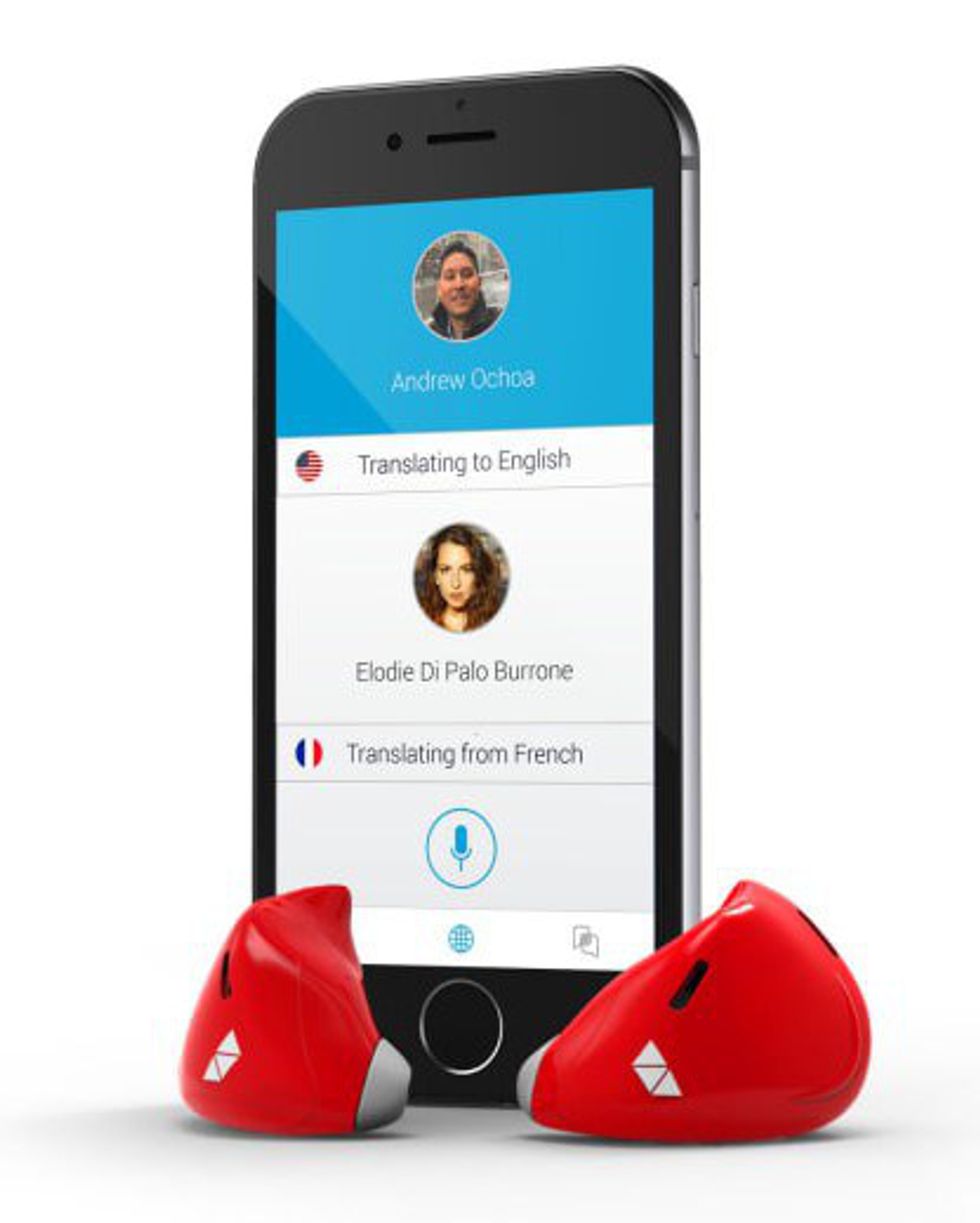From businessmen to study-abroad students, cartoon space pirates to political leaders, “lost in translation” is a common predicament for the international traveler. Different languages can hinder communication, making important information impossible to understand. Google translate, World Reference, and other popular online services can aid the transaction, but they often make mistakes and are hard to use for conversational purposes.
Enter Pilot, Waverly Lab’s newest creation, the world’s first smart earpiece translator.
While two speakers convey in conservation, Pilot enables each person to speak their native language while easily understanding the other. While you speak, your partner receives the translated version in their ear through Pilot. Both speakers must wear an earpiece while your smartphone acts as the brains of the operation.
The design of Pilot is simple, yet comfortable, designed to slip smoothly into the wearer’s ear. The Pilot app that powers the translation has multiple options: Music streaming, Phrasebook and Conference Mode.
For its upcoming release into the general market (May 2017,) Pilot will first translate English, Spanish, French and Portuguese. Shortly after that, the company will offer Hebrew, Slavic, German, East Asian, Arabic, and African languages. Waverly Labs has also revealed additional language options that are still in development.
Multiple publications such as Forbesand The Huffington Post have raved about the modern and exciting aspects of this product. Admittedly, Pilot is an incredibly exciting new product with a bright future ahead, but consumers need to think about the following before adding their name to the wait list:
- Pilot does not translate everything around the wearer—only with people who own an earpiece.
- First version Pilot requires Internet connection; when traveling overseas, you aren’t always guaranteed to have Wi-Fi.
- The translation process adds a couple seconds of delay, creating an awkward pause in the conversation
- Dialects and heavy accents can upset the translation process, producing incorrect translations.
- The earpiece isn’t guaranteed to perfectly fit every person; human ears come in all shapes and sizes, yet the earpiece does not.
But most importantly…
Will this upcoming product add to American’s over-reliance on technology? How will the Pilot contribute to the American attitude towards foreign language education?
Compared to students in Europe, American students have low foreign-language class participation. AP Foreign Language exams taken by students make up less than 5 percent of the total AP Exams taken each year.
From 2009 to 2013, the United States has suffered a 6.7 decline in foreign language enrollment. This trend continues to this day, as students turn towards business and technology courses rather than foreign language electives.Student lack of participation in language courses provokes negative consequences in brain development and cultural understanding. Learning a different language challenges the brain, forcing it to create new pathways to think in a different tongue. It also improves the student’s ability to speak and write in their native language, as well as overall vocabulary. Most importantly, foreign language learning encourages global thought and appreciation for different cultures.
When a Pilot conversation occurs, the receiver understands the automatic, robotic message from the application. There is no human warmth and emotion in these words—just a machine. An earpiece cannot replace the
personal benefits to learning new languages and experiencing different
cultures. Pilot is a remarkable, straight-out-of-Star-Trek invention and it
deserves most of the hype surrounding its prototype. However, we must remember
that a machine can never replace the might of human thought and expression, especially in this day and age.
























 sunrise
StableDiffusion
sunrise
StableDiffusion
 bonfire friends
StableDiffusion
bonfire friends
StableDiffusion
 sadness
StableDiffusion
sadness
StableDiffusion

 purple skies
StableDiffusion
purple skies
StableDiffusion

 true love
StableDiffusion
true love
StableDiffusion
 My Cheerleader
StableDiffusion
My Cheerleader
StableDiffusion
 womans transformation to happiness and love
StableDiffusion
womans transformation to happiness and love
StableDiffusion
 future life together of adventures
StableDiffusion
future life together of adventures
StableDiffusion





















